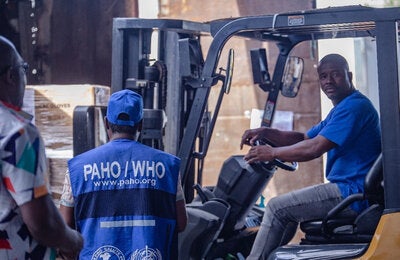
New York, NY, 22 September 2022 (PAHO) —Speaking at a high-level event during the United Nations General Assembly side, the Pan American Health Organization (PAHO) Director Carissa F. Etienne highlighted the aggravating effect of COVID-19 on the health of women, children and adolescents in the region, which have placed these groups at greater risk and threaten to reverse gains made in the past decades.
“It’s clear that we must act now to protect the future of our Region,” Dr. Etienne said today in a video message to the 11th Accountability Breakfast, organized by the Partnership for Maternal, Newborn & Child Health (PMNCH).
Widespread disruptions to maternal and newborn care left expectant mothers and their babies without support during one of the most critical periods of a woman’s life and a baby’s growth,” the Director said in her statement.
Young women were left particularly vulnerable, she added, as “disruptions to family planning services fueled one of the largest increases in teenage pregnancy we’ve seen in more than a decade.” The Americas have the second highest rate of adolescent pregnancy in the world.
The United Nations General Assembly (UNGA) side event, Tackling Conflict, Climate Change and COVID-19: A Triple Threat to Women, Children and Adolescents in Latin America and the Caribbean, brought together high-level speakers to review the impact of current crises and the way forward to address these.
The PAHO Director participated in a panel alongside Kersti Kaljulaid, UN Secretary-General’s Global Advocate for Every Woman, Every Child and Former President of Estonia, and Martin Chungong, Secretary-General, Inter-Parliamentary Union (IPU). Participants also included Helen Clark, PMNCH Board Chair and Former Prime Minister of New Zealand, Christopher Tufton, Minister of Health of Jamaica and Rossana Briceno, Chair of the Spouses of CARICOM Leaders Action Network.
Dr. Etienne also warned that gender-based violence is on the rise in the Americas, and that school interruptions triggered “the worst educational crisis we have ever seen”, as “our kids missed more school days than children in any other region.”
Children and teens across our region are at risk of becoming the generation that missed out on the health, education and economic opportunities they needed to reach their fullest potential,” she cautioned.
Looking forward, the Director reminded the panel that Latin America and the Caribbean have made remarkable progress in recent decades to reduce childhood mortality and expand access to health services, and urged leaders to “lean on these past experiences and refocus our efforts as we rebuild from this pandemic.”
This includes stepping up efforts to restore children’s annual check-ups and routine vaccinations from preventable diseases like polio, measles and rubella, which have lagged during the pandemic.
She also called for comprehensive, evidence-based programs to empower schools, communities and families to care for young people so that these can thrive, and urged countries to “bring women, children and adolescents to the table and work with them to shape the interventions that are intended to reach them.”
As part of PAHO’s participation at the UNGA, interim Assistant Director Marcos Espinal also joined a high-level Round Table on Global Solutions to Face Infectious Diseases on 21 September, organized by the Wellcome Trust.
Established in 2005 and hosted by the World Health Organization, the Partnership for Maternal, Newborn & Child Health (PMNCH) is the world’s largest alliance for women’s, children’s and adolescents’ health and well-being. PMNCH brings together 1,250 partners, including governments, NGOs, adolescent and youth groups, private sector organizations, health professional associations, academic and research institutions, inter-governmental organizations, and UN agencies.



